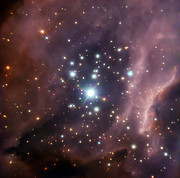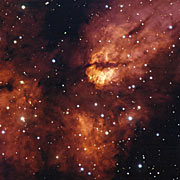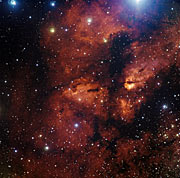Persbericht
Een kijkje in een ‘hels’ stervorminggebied
19 augustus 2009
ESO heeft opnamen vrijgegeven van het centrum van een kosmische wolk annex sterrenhoop, RCW 38 genaamd, waarin het wemelt van sterren en planetaire systemen in wording. Jonge sterren bestoken er met krachtige wind en vlammend licht beginnende sterren en planeten, hierbij geholpen door zware sterren die exploderen als supernovae. In sommige gevallen vernietigt deze aanval de materie die uiteindelijk nieuwe zonnestelsels zou kunnen vormen. Wetenschappers denken dat ons zonnestelsel in zo’n omgeving is ontstaan.
RCW 38 bevindt zich op 5500 lichtjaar afstand in het sterrenbeeld Vela (Zeilen). Net zoals de Orionnevel is RCW 38 een ‘omsloten cluster’, de sterrenhoop is omgeven door een wolk van gas en stof, waaruit de sterren zijn ontstaan. Astronomen hebben ontdekt dat de meeste sterren, inclusief de meest voorkomende rode lage-massa sterren, ontstaan in deze materierijke gebieden. Deze ‘omsloten clusters’ verschaffen wetenschappers een levend laboratorium waar ze de mechanismen van ster- en planeetvorming kunnen bestuderen.
“Door te kijken naar sterrenhopen zoals RCW 38 kunnen we veel leren over het ontstaan van zonnestelsels, sterren en planeten,” zegt Kim DeRose, eerste auteur van een nieuwe studie die verschijnt in ‘Astronomical Journal’. DeRose bestudeerde RCW 38 toen ze student was bij het Harvard-Smithsonian Center voor Astrofysica in de Verenigde Staten.
Astronomen hebben met behulp van de NACO adaptieve optiek techniek van ESO’s Very Large Telescope [1] de scherpste opnamen ooit gemaakt van RCW 38. Zij richtten zich op een klein gebied in het centrum van het cluster rondom de zware ster IRS2, die witblauw gloeit en behoort tot de heetste sterren. Uit deze waarnemingen is gebleken dat IRS2 in werkelijkheid bestaat uit twee afzonderlijke sterren – een dubbelstersysteem van twee gloeiendhete sterren op een onderlinge afstand van ongeveer 500 keer de afstand aarde-zon.
Op de NACO opname ontdekten de astronomen een handvol protosterren, de zwakschijnende voorlopers van volwaardige sterren, en tientallen andere sterren in wording die zijn ontstaan ondanks de intense ultraviolette straling van IRS2. Sommige van deze sterren in wording zullen echter niet verder komen dan de protoster fase. De intense straling van IRS verspreidt de materie zodat sommige protosterren zich nooit tot volwaardige sterren kunnen ontwikkelen, en bij andere zal de planeetvorming worden bemoeilijkt.
Ook komen in sterrenkraamkamers zoals RCW 38 veel supernovae tot uitbarsting, reuzensterren die aan het einde van hun leven exploderen. Het materiaal dat zij uitstoten bevat onder andere zeldzame isotopen – exotische chemische elementen die zijn ontstaan in deze stervende sterren. Dit uitgestoten materiaal komt uiteindelijk terecht in de volgende generatie sterren die zich in de nabije omgeving vormen. In onze zon zijn ook zulke isotopen aangetroffen, daarom denken astronomen dat de zon ook is ontstaan in een sterrenhoop zoals RCW 38, in plaats van in een rustiger deel van de Melkweg.
“De details van astronomische objecten die met adaptieve optiek worden ontdekt zijn van cruciaal belang om te begrijpen hoe ster- en planeetvorming plaatsvindt in complexe, chaotische gebieden zoals RCW 38,” zegt co-auteur Dieter Nürnberger.
Noten
[1] De naam NACO is een combinatie van de Nasmyth Adaptive Optics System (NAOS) en de Near-Infrared Imager en Spectrograph (CONICA). Met adaptieve optiek kan men beeldverstoringen door turbulentie in de aardse atmosfeer grotendeels corrigeren.
Meer informatie
Dit onderzoek is gepresenteerd in een paper dat verschijnt in Astronomical Journal: A Very Large Telescope / NACO study of star formation in the massive embedded cluster RCW 38, by DeRose et al. (2009, AJ, 138, 33-45).
Het team bestaat uit K.L. DeRose, T.L. Bourke, R.A. Gutermuth en S.J. Wolk (Harvard-Smithsonian Center for Astrophysics, Cambridge, USA), S.T. Megeath (Department of Physics and Astronomy, The University of Toledo, USA), J. Alves (Centro Astronómico Hispano Alemán, Almeria, Spain), en D. Nürnberger (ESO).
ESO, de Europese Zuidelijke Sterrenwacht, is de belangrijkste intergouvernementele sterrenkundeorganisatie in Europa en wereldwijd het meest productieve astronomische observatorium. ESO wordt ondersteund door 14 landen: België, Denemarken, Duitsland, Finland, Frankrijk, Italië, Nederland, Oostenrijk, Portugal, Spanje, Tsjechië, het Verenigd Koninkrijk, Zweden en Zwitserland. ESO voert een ambitieus programma uit gericht op het ontwerp, de bouw en de exploitatie van krachtige grondobservatoria die astronomen in staat stellen om belangrijke wetenschappelijke ontdekkingen te doen. ESO speelt ook een leidende rol in het bevorderen en organiseren van samenwerking in het sterrenkundig onderzoek. ESO exploiteert drie observatielocaties van wereldklasse in Chili: La Silla, Paranal en Chajnantor. Op Paranal exploiteert ESO de Very Large Telescope (VLT), 's werelds meest geavanceerde optische observatorium en ESO is de Europese partner van de revolutionaire telescoop ALMA. ESO is momenteel bezig met ontwerpstudies voor de 42-meter Europese Extremely Large optische/nabij-infrarood Telescoop ( E-ELT), die ‘het grootste oog op de hemel’ ter wereld zal worden.
Links
- Science paper: http://arxiv.org/abs/0904.3279 or http://www.iop.org/EJ/abstract/1538-3881/138/1/33/
- Adaptive optics page
- VLT page
Contact
Dieter Nürnberger
ESO
Chile
Tel: +56 2 463 3080
E-mail: dnuernbe@eso.org
Marieke Baan (Perscontact Nederland)
ESO Science Outreach Network
en NOVA Informatie Centrum
Tel: +31(0)20-5257480
E-mail: eson-netherlands@eso.org
Over dit bericht
| Persberichten nr.: | eso0929nl |
| Legacy ID: | PR 29/09 |
| Naam: | RCW 38 |
| Type: | Milky Way : Star : Grouping : Cluster |
| Facility: | Very Large Telescope |
| Instruments: | NACO |
| Science data: | 2009AJ....138...33D |
Our use of Cookies
We use cookies that are essential for accessing our websites and using our services. We also use cookies to analyse, measure and improve our websites’ performance, to enable content sharing via social media and to display media content hosted on third-party platforms.
ESO Cookies Policy
The European Organisation for Astronomical Research in the Southern Hemisphere (ESO) is the pre-eminent intergovernmental science and technology organisation in astronomy. It carries out an ambitious programme focused on the design, construction and operation of powerful ground-based observing facilities for astronomy.
This Cookies Policy is intended to provide clarity by outlining the cookies used on the ESO public websites, their functions, the options you have for controlling them, and the ways you can contact us for additional details.
What are cookies?
Cookies are small pieces of data stored on your device by websites you visit. They serve various purposes, such as remembering login credentials and preferences and enhance your browsing experience.
Categories of cookies we use
Essential cookies (always active): These cookies are strictly necessary for the proper functioning of our website. Without these cookies, the website cannot operate correctly, and certain services, such as logging in or accessing secure areas, may not be available; because they are essential for the website’s operation, they cannot be disabled.
Functional Cookies: These cookies enhance your browsing experience by enabling additional features and personalization, such as remembering your preferences and settings. While not strictly necessary for the website to function, they improve usability and convenience; these cookies are only placed if you provide your consent.
Analytics cookies: These cookies collect information about how visitors interact with our website, such as which pages are visited most often and how users navigate the site. This data helps us improve website performance, optimize content, and enhance the user experience; these cookies are only placed if you provide your consent. We use the following analytics cookies.
Matomo Cookies:
This website uses Matomo (formerly Piwik), an open source software which enables the statistical analysis of website visits. Matomo uses cookies (text files) which are saved on your computer and which allow us to analyze how you use our website. The website user information generated by the cookies will only be saved on the servers of our IT Department. We use this information to analyze www.eso.org visits and to prepare reports on website activities. These data will not be disclosed to third parties.
On behalf of ESO, Matomo will use this information for the purpose of evaluating your use of the website, compiling reports on website activity and providing other services relating to website activity and internet usage.
Matomo cookies settings:
Additional Third-party cookies on ESO websites: some of our pages display content from external providers, e.g. YouTube.
Such third-party services are outside of ESO control and may, at any time, change their terms of service, use of cookies, etc.
YouTube: Some videos on the ESO website are embedded from ESO’s official YouTube channel. We have enabled YouTube’s privacy-enhanced mode, meaning that no cookies are set unless the user actively clicks on the video to play it. Additionally, in this mode, YouTube does not store any personally identifiable cookie data for embedded video playbacks. For more details, please refer to YouTube’s embedding videos information page.
Cookies can also be classified based on the following elements.
Regarding the domain, there are:
- First-party cookies, set by the website you are currently visiting. They are stored by the same domain that you are browsing and are used to enhance your experience on that site;
- Third-party cookies, set by a domain other than the one you are currently visiting.
As for their duration, cookies can be:
- Browser-session cookies, which are deleted when the user closes the browser;
- Stored cookies, which stay on the user's device for a predetermined period of time.
How to manage cookies
Cookie settings: You can modify your cookie choices for the ESO webpages at any time by clicking on the link Cookie settings at the bottom of any page.
In your browser: If you wish to delete cookies or instruct your browser to delete or block cookies by default, please visit the help pages of your browser:
Please be aware that if you delete or decline cookies, certain functionalities of our website may be not be available and your browsing experience may be affected.
You can set most browsers to prevent any cookies being placed on your device, but you may then have to manually adjust some preferences every time you visit a site/page. And some services and functionalities may not work properly at all (e.g. profile logging-in, shop check out).
Updates to the ESO Cookies Policy
The ESO Cookies Policy may be subject to future updates, which will be made available on this page.
Additional information
For any queries related to cookies, please contact: pdprATesoDOTorg.
As ESO public webpages are managed by our Department of Communication, your questions will be dealt with the support of the said Department.





